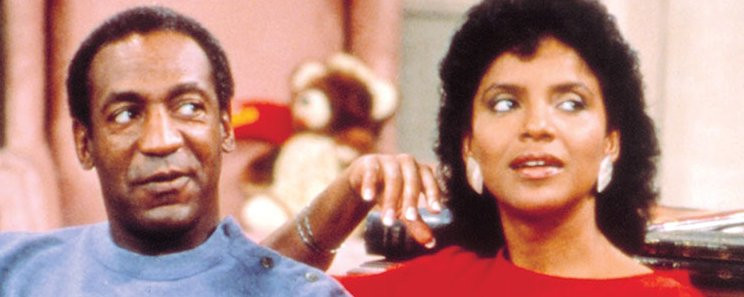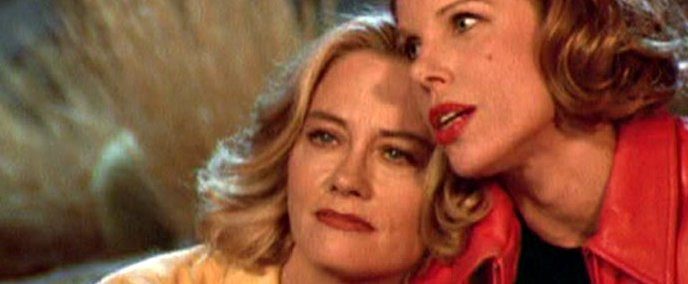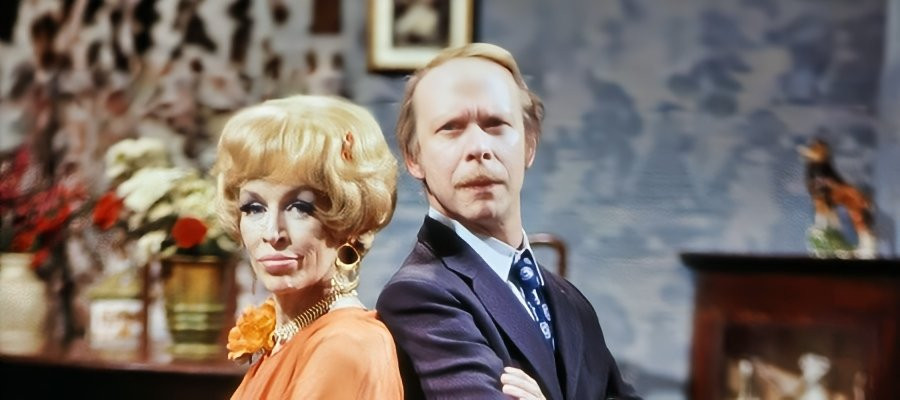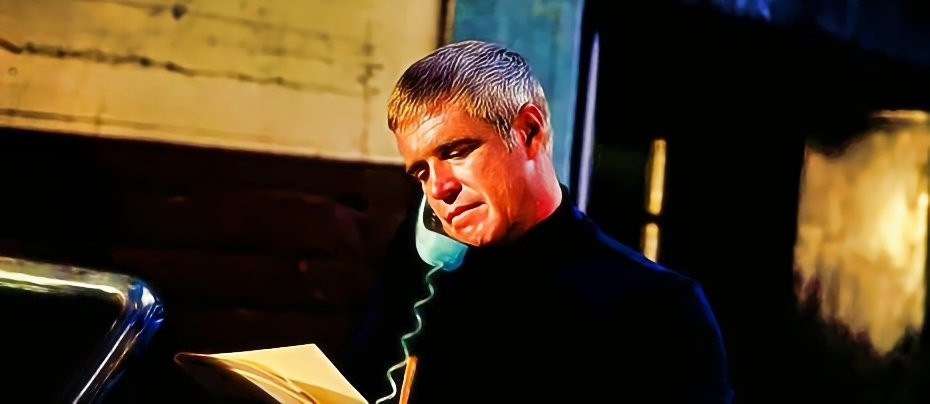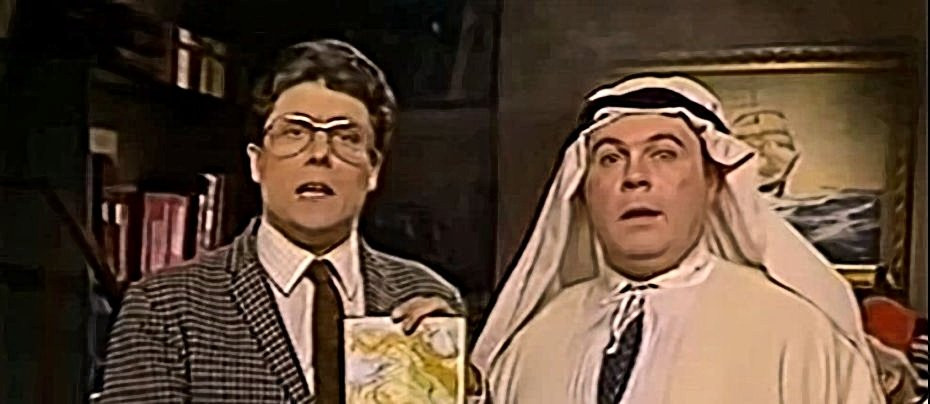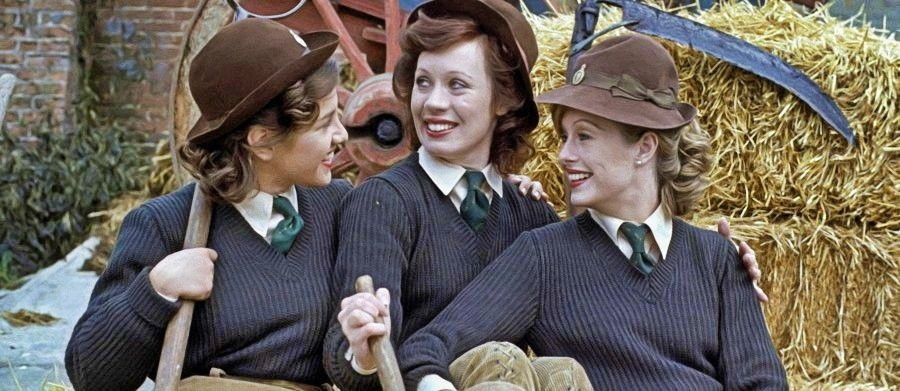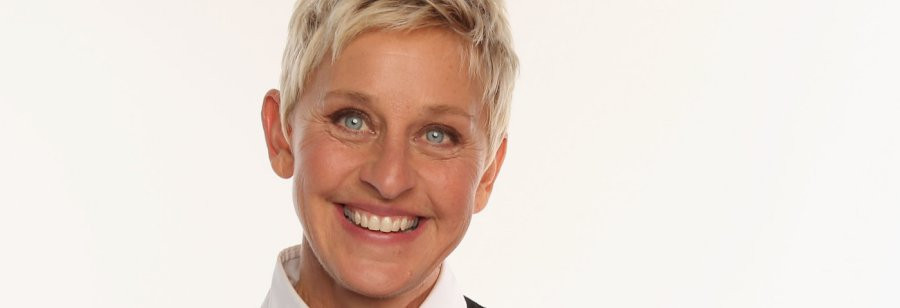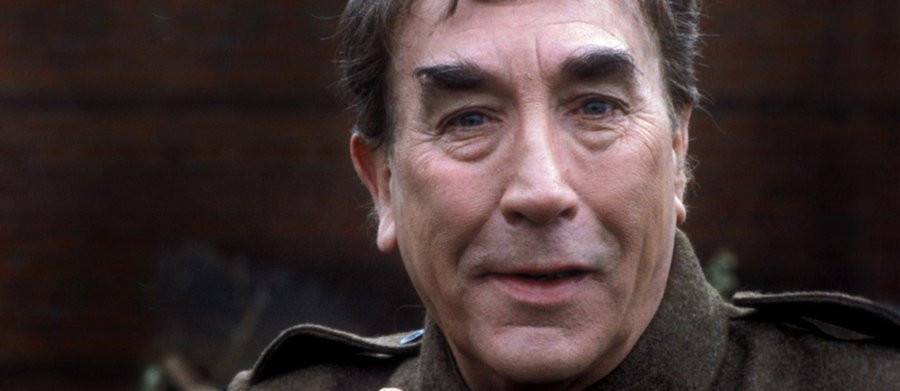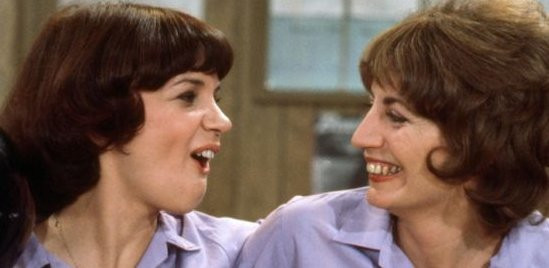
Laverne & Shirley
1976 - United StatesOne of the most successful US series of the late 1970's, Laverne & Shirley was a spin-off of the popular 1950's themed sitcom Happy Days. Thanks to its two stars, plus the best slapstick since I Love Lucy, Laverne & Shirley became a Tuesday night institution.
Like Happy Days, Laverne and Shirley was set in Milwaukee in the late 50's. Tough-talking and strong Laverne De Fazio (Penny Marshall), and her dreamy, trusting roommate Shirley Feeney (Cindy Williams) worked as bottle cappers for the Shotz Beer brewery. Their apartment building was run by landlady Mrs. Havenwurst (Helen Page Camp); she was replaced a few episodes later by new landlady Edna Babish (Betty Garrett). Also living in the building were dense and borderline dumb roommates (and Shotz truck drivers) Andrew "Squiggy" Squiggman (David L. Lander) and Lenny Kosnowski (Michael McKean). (The two men created "greaser" characters during their college years; Penny Marshall recommended Lander and McKean when the writers decided some extra characters were necessary.) Veteran comic Phil Foster played Laverne's father Frank, who ran the local hangout "The Pizza Bowl" (he later married Mrs. Babish) and Eddie Mekka appeared as Shirley's admirer Carmine Ragusa--also known as "The Big Ragu".
The plots were not much--Laverne and/or Shirley would get into some financial or romantic complication, and by the end of each episode, the problem was resolved, but not before the girls went through a series of stunts. It was the well-done physical humour that gave Laverne & Shirley a feel different from most other sitcoms of the period (which depended on dialogue and character rather than broad comedy), and made the show perfect for the "family hour". Some critics likened the show to the days of Lucille Ball and Vivian Vance (and indeed, producer Gary Marshall--Penny's brother-- was a writer on The Lucy Show in the early 1960's) Not that critics loved Laverne & Shirley; most of the reviews centered on the thin plots and simple situations. But Gary Marshall made no apologies for the style: "I go for the gut. I want (viewers) to laugh hard. I don't want them quietly staring at a bright, witty show".
The characters of Laverne and Shirley had their own quirks. Man-crazy Laverne was street-wise and had a habit of wearing clothes with a stylized "L" on the front. She also loved drinking milk and Pepsi. Shirley was a romantic, dreamy idealist who frequently worried about staying a virgin until her wedding night; her closest relationship (besides Laverne) was her beloved stuffed animal "Boo Boo Kitty".
Before this series, Penny Marshall appeared on various sitcoms such as brother Gary's The Odd Couple, The Mary Tyler Moore Show and the short-lived Paul Sands In Friends And Lovers. Williams was a veteran of commercials and guest roles, but her pre-"Laverne" claim to fame was as Ron Howard's girlfriend in the now-classic nostalgia film 'American Graffiti.' The two women first appeared on a fall 1975 episode of Happy Days as dates for The Fonz (Henry Winkler) and Richie Cunningham (Howard). The episode was well-received and ABC wanted a series as quickly as possible. With no time to film a full-fledged pilot, Gary Marshall (who also produced Happy Days) had his writers come up with a fast ten minute script. One night after filming an episode of Happy Days, Marshall asked his live studio audience to stick around and watch the short pilot. ABC executives loved the chemistry between the two women and bought the series; the first episode aired on January 27th, 1976 as a midseason replacement.
Laverne & Shirley became the first situation comedy ever to hit number one in the weekly ratings with its first airing. The show stayed among the top three series for the next two years, and became the highest-rated program of the 1977-78 and 1978-79 seasons. That performance (and that of Happy Days and other series) helped former third-place ABC jump to number one among US networks for the rest of the decade.
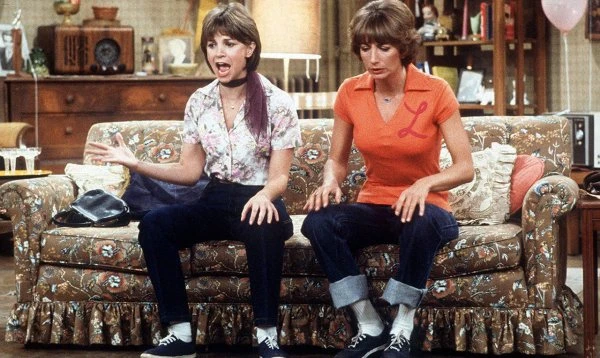
While all appeared happy and carefree on the television screen, there were problems behind the scenes. Both Marshall and Williams were relatively young, and the sudden success of Laverne & Shirley led to friction between the two stars. Part of the problem was the fact that the Marshall family was just about everywhere on the show--Penny on screen; brother Gary producing; father Tony and other siblings behind the scenes. (At the time, Penny was also married to Rob Reiner, who was portraying son-in-law Mike Stivic on All In The Family.) Penny would later say that she felt she didn't earn her success because her brother picked her to co-star. The ties weren't any easier for Williams; she often felt as if she were an outsider in a weekly family reunion. During the first several seasons, there were reported fights on the set; both actresses had contracts that specified each would get the same amount of money and perks. At one point, Williams reportedly walked off the set in tears; new writers were brought in and calm was restored for the most part.
In 1979, ABC made two mistakes: Laverne & Shirley moved out of the Fabulous Fifties and into the Swinging Sixties. Even worse, the show was moved from its familiar Tuesday night perch behind Happy Days, to lead off ABC's Thursday night schedule. It was disastrous; the former top-rated series dropped out of the top 25. ABC eventually moved the series back to its old timeslot but the damage was done, and the show would never hit number one again. The fall of 1980 had the two single women pack up and move from Milwaukee to Burbank, California, in an attempt to add new life to the sitcom. Naturally, most of the regulars made the move with Laverne and Shirley; a new character was added--stuntman and landlord Sonny St. Jacques. (Actor and former pro football player Ed Marinaro, who played Sonny, left after one year to take the role of Officer Joe Coffey on the groundbreaking police drama Hill Street Blues.)
By 1982, Cindy Williams had married in real life and was expecting a baby. The studio wanted her to work her regular hours; Williams refused, saying she wanted to take it easy. Fed up with the demands, the pregnant Williams walked off the Laverne & Shirley set--this time for good. To explain her departure, the producers had Shirley meet an army medic named Walter Meany; the two quickly married but Walter had to ship out overseas and Shirley went with him. Now the show was essentially "Laverne", leaving Marshall to pick up the comedy baton alone. But without Shirley, viewers flocked elsewhere--specifically to NBC, after that network launched the high-powered action series The A-Team; its rise to the top ten spelled the end of the line for Laverne & Shirley and the show ended its run in 1983.
Laverne & Shirley's catchy theme song "Making Our Dreams Come True", written by songsmiths Norman Gimbel and Charles Fox, was a top-25 hit for singer Cyndi Grecco (who also warbled the theme every week). In the early 1980's, the series spawned two animated Saturday morning series. Laverne & Shirley In The Army and Laverne & Shirley With The Fonz; both aired on ABC. After "L&S;" left the airwaves, Penny Marshall became one of the most successful female film directors in American history, with such movies as Big; Awakenings; and A League Of Her Own under her belt. Cindy Williams tried a couple of sitcoms in the 1990's, but they weren't as successful as Laverne & Shirley. Two "clip" reunion specials aired in recent years, the last with Marshall and Williams in May 2002.
The series may have had its faults, but it showed two strong, independent women making personal and career decisions for themselves--a trend that began in the 1970's and would continue in the years to come. And despite its critics, so would the reruns of Laverne & Shirley.
Seen this show? How do you rate it?
Seen this show? How do you rate it?
Published on December 29th, 2018. Written by Mike Spadoni (2002) for Television Heaven.


